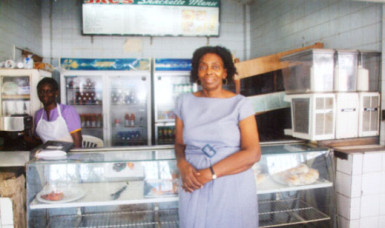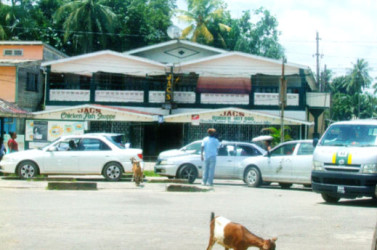Jacqueline Ann Camille Smith (the first letters of her full name spell out the trading name of the business that she operates) defines the economic tailspin that has plagued Linden for more than a decade in terms to which she can personally relates as a businessperson.
In its prime, during the halcyon days of the mining town, the bakery that is part of the establishment she and her husband Stan Smith own, produced the equivalent of 30-40 bags of flour worth of bread daily. Production has shrunk to the equivalent of 3-4 bags of flour daily.
These days, JACS Snackette, Bakery and Guest House cuts a less than imposing figure on Republic Avenue in Linden. Smith concedes that the premises can do with a facelift. What JACS reflects, though, is the determination of a community, which over the years though beset by an assortment of socio-economic ills, not to simply roll over and die.

Smith attributes the survival of the enterprise to “the will of God,” though, truth be told, the resilience of herself, her husband and their 30-odd staff cannot be discounted.
The business started as a hotel in 1990 and a lucrative contract to provide the bauxite company, LINMINE, with meals, meant that business flourished. That allowed not only for diversification into a bakery and snackette but relocation to bigger premises on Republic Avenue.
JACS’ reputation for its bakery products spread across Linden, onto the highway and into the upper reaches of Kwakwani. The distribution chain persists, albeit on a significantly reduced scale, with delivery undertaken thrice weekly by four trucks owned by the company. These days too JACS must cope with competition from Banks, Bakewell and Aubrey’s, among others.
The crisis in Linden has sharpened Smith’s instincts for understanding the community which her business serves. Linden, she says, is a “tennis roll town.” By that she means that there is a greater demand for tennis rolls. She used to offer six rolls in a bag for $160. These days she makes the slightly more generous offer of ten rolls for $240.

In an economic environment of continual decline, the Smiths are burdened by overwhelming responsibilities. Most of the entity’s 30-odd staff are women and Smith says that doing business is as much about sustaining her staff and their families as it is about making a profit. She disclosed that in order to cut operating costs she has had to place her workers on a 40-hour week. Things could get worse but she is afraid to go down that road.
The Guest House used to be a thriving establishment too. That is no longer the case. When Stabroek Business interviewed Smith, the ten rooms in the Guest House were empty, though she was banking on bookings for nine visitors the following evening who were due to travel to Linden for a religious event.
Smith believes that there are ways in which Linden can be helped short of official handouts. She recalls that during her husband’s tenure as Mayor there had been the introduction of a fee for traders from outside of Linden travelling to the town to sell their goods. She believes that in the current crisis there should be a return to initiatives that could provide businesses in the community with a competitive edge.
Like so many other Lindeners she too is banking on a stimulus package that will bring job-related projects to Linden and create demand for the goods and services being offered by community businesses. There are, she says, other challenges, like a scarcity of skills in the town. Even if the jobs were available there would be dire need for training.
The virtues of diversification are borne out, she says, by the fact that in these tough times it is the snackette that is driving the enterprise. JASCS, she says, has always had a sound reputation with food and its customers have stayed the course. Much of it is modest meals – pastries such as pine tarts and cheese rolls; roti and curry and other routine dishes. It targets working men and women and increasingly these days, schoolchildren.




